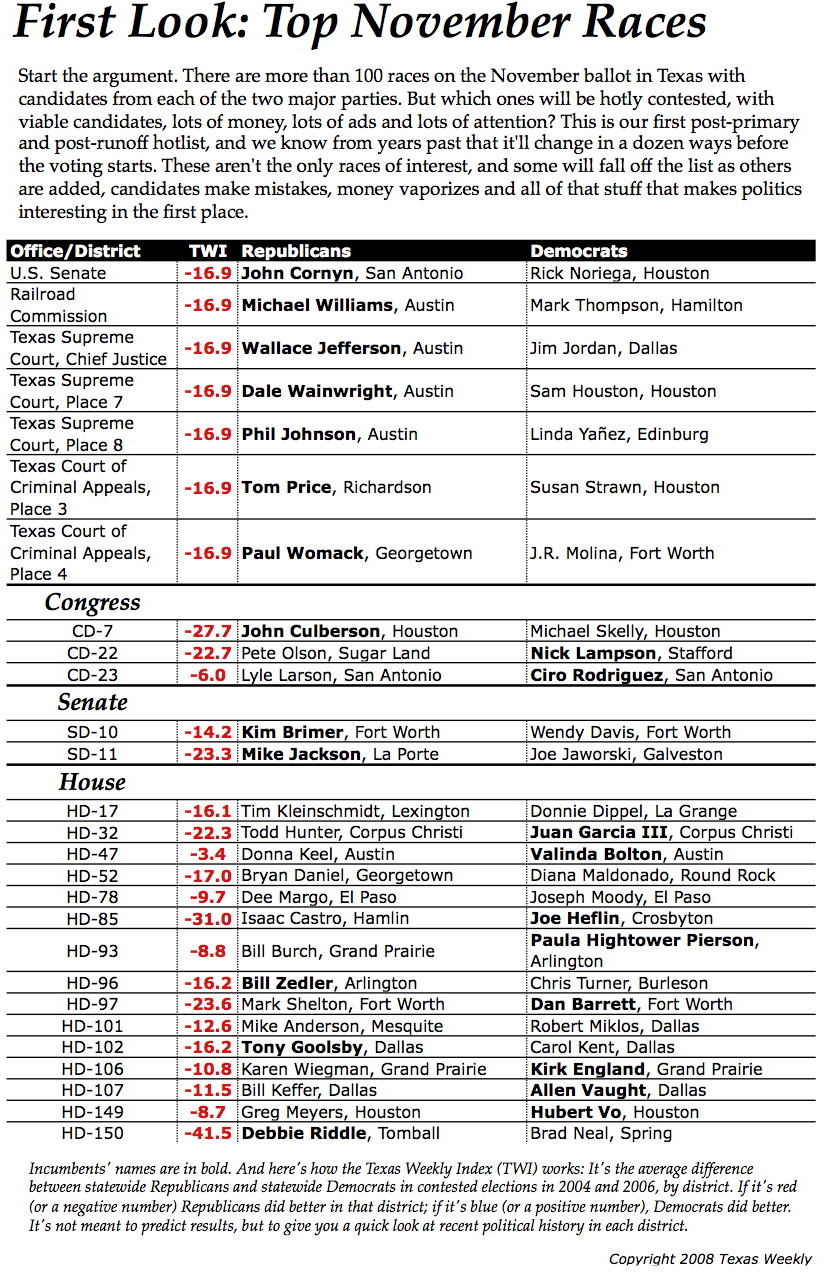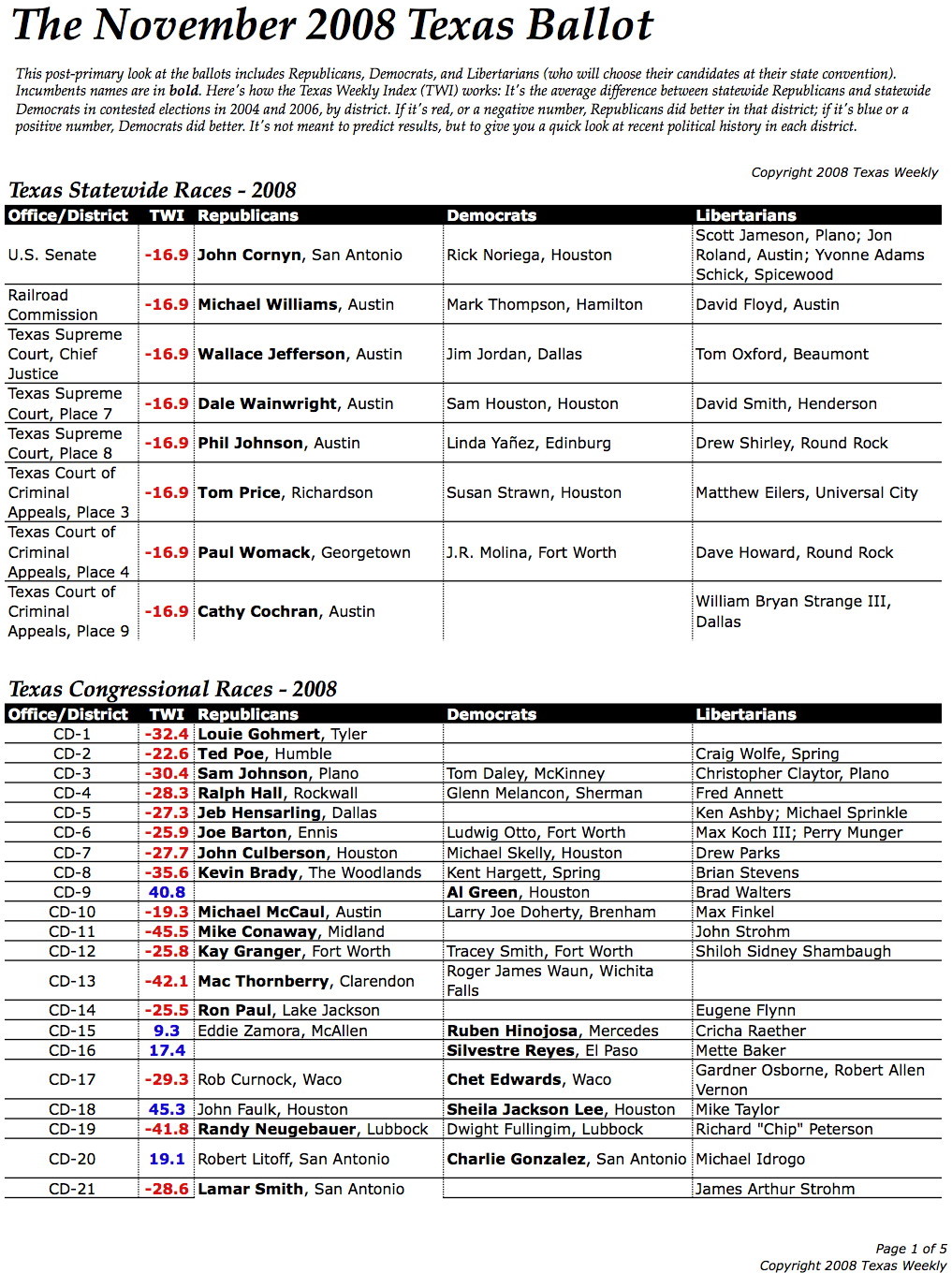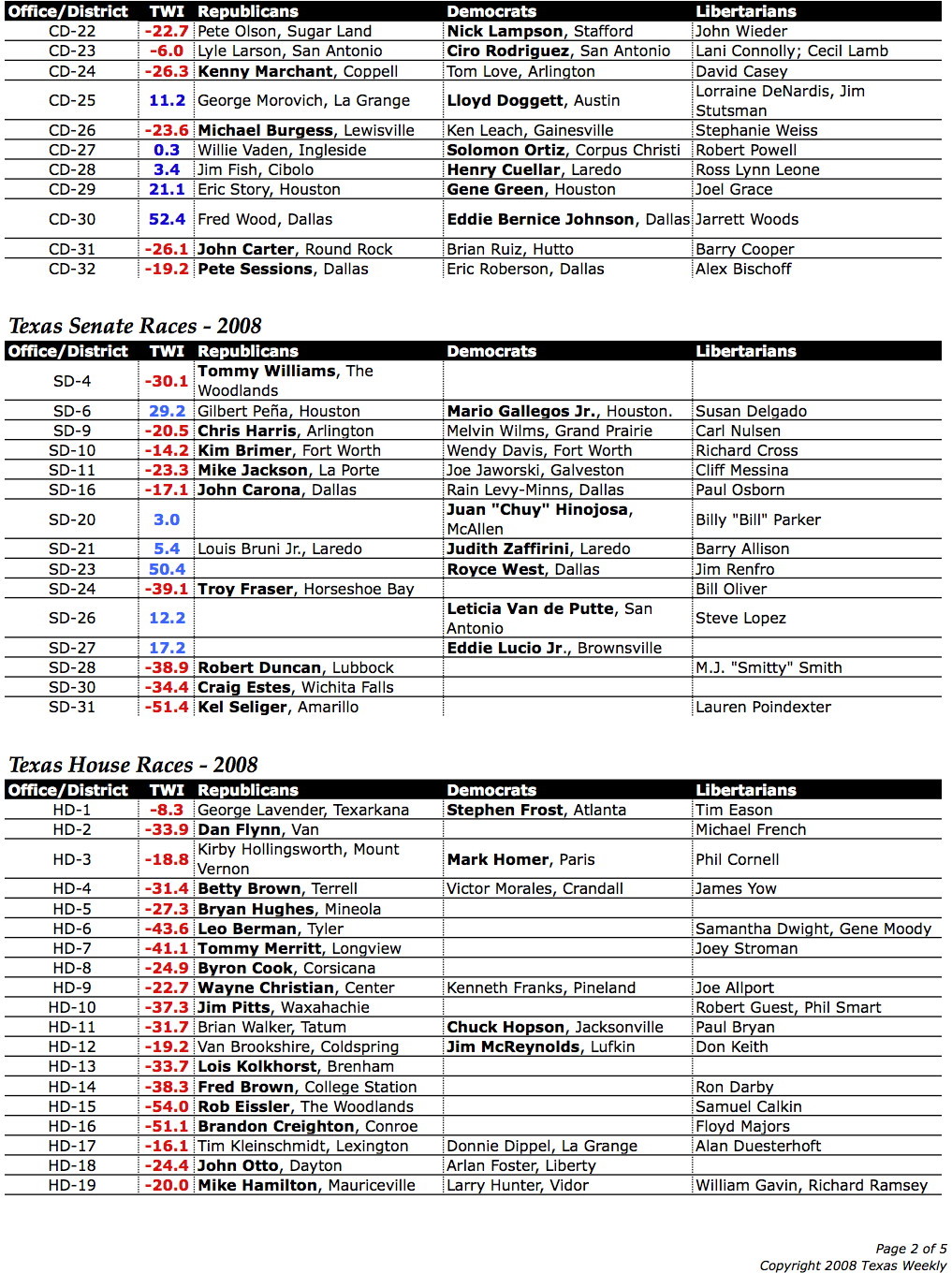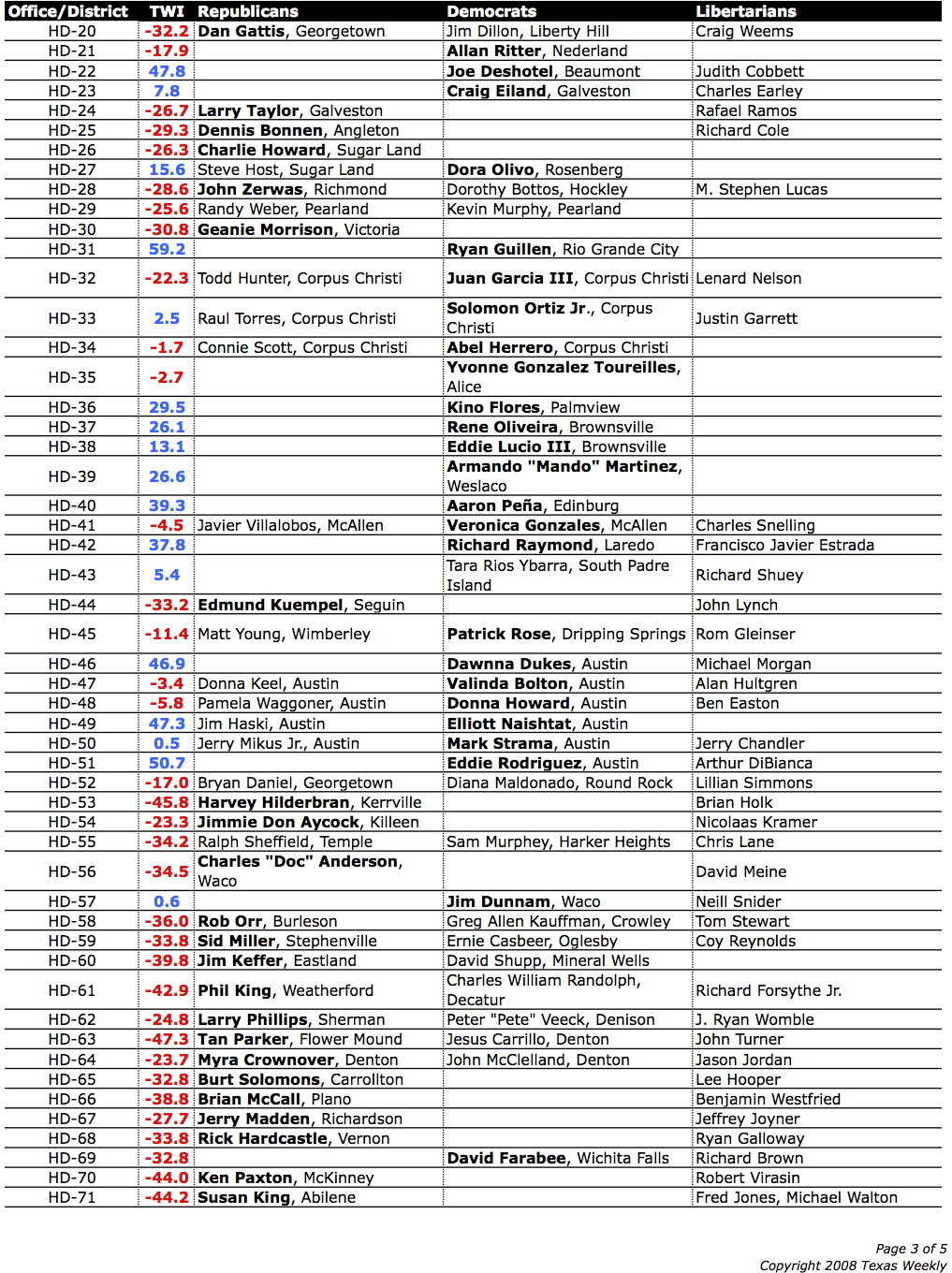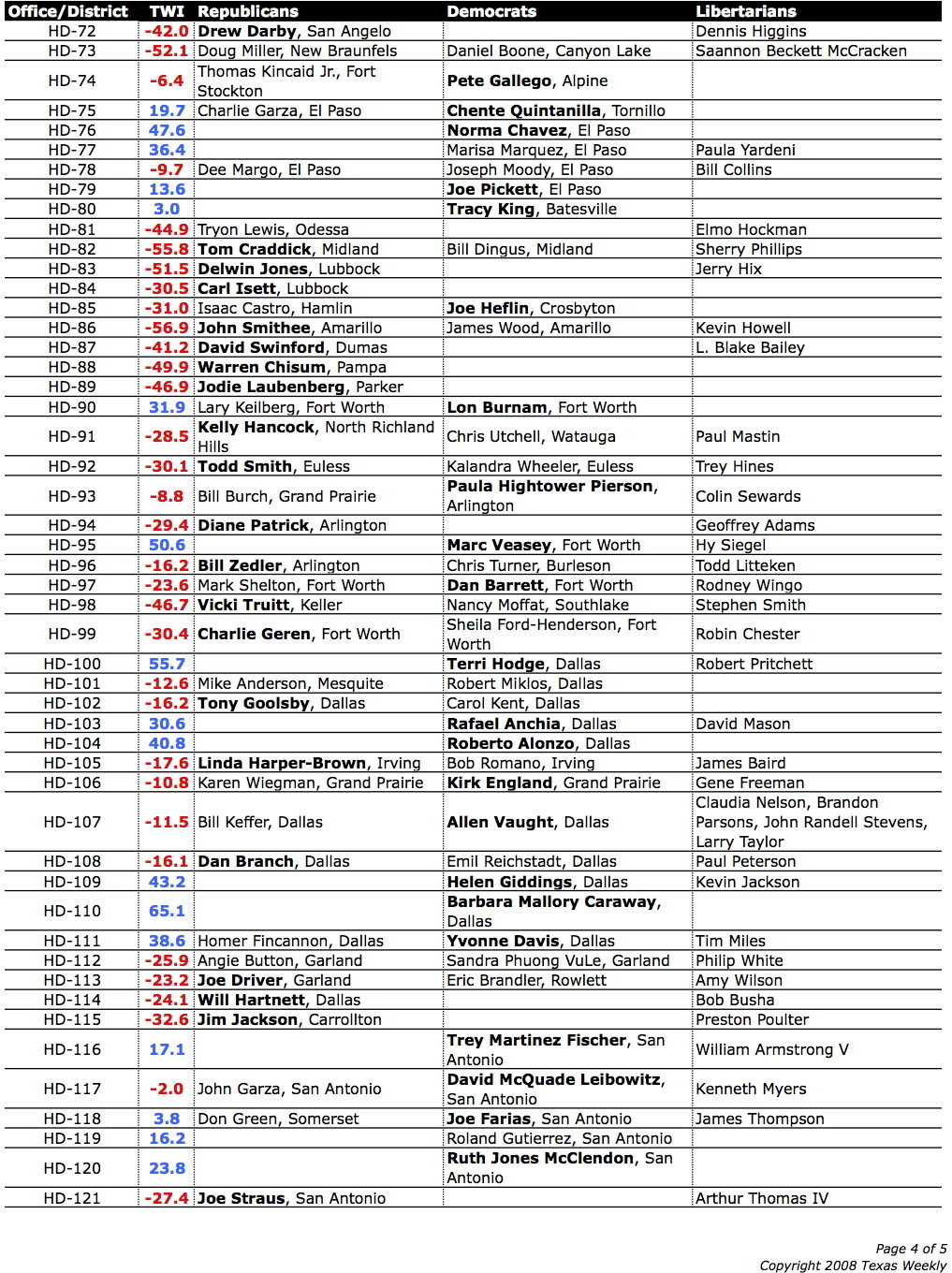Gov. Rick Perry, talking to reporters from The Dallas Morning News and the Fort Worth Star-Telegram, became the first candidate to say — without reservations — that he'll be on the gubernatorial ballot in 2010.
The pronouncement could dirty some diapers in the political nursery.
U.S. Sen. Kay Bailey Hutchison has professed some interest in the job, but hasn't said for certain whether she'll seek the job. And Lt. Gov. David Dewhurst includes it on his list of possibles, a list that could include a reelection bid, a bid for governor or a bid for U.S. Senate, depending on what's open when he's ready to decide his next move.
Democrats who get mentioned for the 2010 race include Houston Mayor Bill White, former Texas Tech Chancellor John Montford, and former Comptroller John Sharp.
There's plenty of time for speculation. The filing deadline is in January 2010 — more than 20 months from now.
The Austin American-Statesman caught Hutchison in Washington and put a tape of that conversation on their website.
"I am very encouraged by people asking me to come home and run for governor to provide leadership for Texas," Hutchison told that paper. "I just think it's too early to make a decision like that, because I'm working very hard for candidates this cycle and I don't want to do something that's unfair to them. So, it is a decision that I will make at the appropriate time."
Dewhurst said he'll decide later what's next in his political career. "My focus is on the 2009 legislative session and continuing to build on our successes over the past five years," he said. "Whatever I decide to do after that will be based on what's best for Texas."
Until now, Perry has been hinting at another race, saying he'll run again if he doesn't finish the things he thinks need to be completed (he's been vague about what's on that list). His comments to the Dallas paper, later confirmed by an aide, were he first time he or anyone else has flatly declared a candidacy.
Texas governors have been elected three times before, but not since terms were lengthened to four years from two. By the time those 2010 elections roll around, Perry will already be the longest-serving governor in state history (he'll pass Bill Clements' eight-year record early next year). He took office after George W. Bush was elected president and then won elections in 2002 and 2006. Another term would give him up to 14 years in the Governor's Mansion.
Yeah, but...
What does it mean that Gov. Rick Perry will seek another term?
It puts him back in charge of the conversation. Kay Bailey Hutchison has been talking to supporters and potential supporters for months about a race for governor, with the conventional assumption that it'll be an open seat in 2010.
Now that Perry's weighed in, the finance people in the GOP can't support Hutchison without first spurning Perry. Even if they're predisposed to that, it's a risky action to take against a sitting governor in your own party.
Hutchison and, to a lesser extent, Lt. Gov. David Dewhurst, have been openly eyeing the job without committing to a run. One common line of conversation in political circles was that if either of the two would simply say they were running, everyone else's hand would be forced in a political game of "Dare Ya." Hutchison talked to potential backers in 2002 and 2006 and decided not to run against Perry each time.
That speculation, moving attention from the present to the future, weakens the incumbent's hold on the office. Perry, the present and now — because of his declaration — the future, is back in control.
It dampens the speculation about who's doing what in the next election cycle. The endless games of musical political chairs hinge on an open seat somewhere near the top of the ballot. They go like this: If Perry doesn't run, this person will run for governor and then their position will open up, and then other positions will open as each officeholder sees a higher rung to grab, and so on. Hutchison and Dewhurst haven't said they're going anywhere, for sure, and Perry's staying. Where's the open seat?
It makes it more difficult for ambitious Republicans to plan their next fights. They can't talk widely about their plans without offending current officeholders. Everybody's got to wait a bit.
Democrats have been playing musical chairs, too, trying to figure out what statewide seats might be open and which incumbents might be vulnerable if they try to stay. And those who want to be governor have a new thing to ponder: Perry only got 39 percent in the last election against three challengers. Is he beatable? He'll have been governor for ten years if he runs again. Will people want more?
If he succeeded in killing lame duck speculation, Perry might have accomplished something else: Moving the 2010 election out of 2008, where the speculation has threatened to swamp a lackluster political fight card, and into 2009, where it can compete with the Legislature for attention.
ABCs, Minus One
Subtract Rep. Todd Smith from the group working to replace House Speaker Tom Craddick with another Republican.
The Euless Republican reads the primary and runoff election results to mean no other Republican will be elected in Craddick's place next year.
"It is simply a reaction to the facts on the ground," says Smith, who's been a critic of the speaker, regularly counted among the ABC — Anybody But Craddick — vote in the House. "Everybody knows I've supported candidates... his candidates won in those races and my candidates lost in those races.
"The facts changed and I am reacting to the facts... I no longer see a scenario where we get a Republican speaker who is not Craddick," Smith says.
He thinks there's a chance the Democrats will take the House in November and elect a speaker of their own; the Republicans currently outnumber Democrats by eight in the House, and five Democratic victories would change the majority.
But after congenial conversations with former Rep. Terral Smith, who's now Craddick's chief of staff, and with Craddick himself, Todd Smith is playing to get along. He says he hasn't signed a pledge to vote for another term for Craddick, that he still wants a change in the rules, and that "I'm not willing to sell my vote from my desk." But, he says, "it is better for me and for my district to try to get along, and that's what I'm doing."
Asked about the reconciliation, a spokeswoman for Craddick, Alexis DeLee, said, "The Speaker and he have had a conversation and we look forward to working with him."
Smith says no particular result changed his mind. Craddick's candidates generally did better than those of his opponents, both in March and in the April runoffs, and Smith thinks the math is clear: "It'll be Craddick, or a Democrat."
Dingus for Dingus?
If Midland City Councilman Bill Dingus is ineligible to run for the state Legislature — as a federal judge contended in a ruling this week — he could be replaced on the ballot by an eligible Democrat.
And he might be his own replacement.
Lawyers are still poring over the decision from U.S. District Judge Walter Smith of Waco. It didn't order Dingus off the ballot, but stopped just short of it: "The Court agrees that a person holding a lucrative office, such as a member of the Midland City Council, is not eligible to become a candidate for the Texas Legislature."
Dingus was relying on another judge's opinion when he signed up for the HD-82 race while remaining on the council.
Lawyers are looking for a remedy. If Dingus is illegal, as Judge Smith says, he can't cure the problem by simply resigning. Instead, Democrats would have to knock him off the ballot and then replace him with someone selected by party official from the district's five counties (Crane, Dawson, Martin, Midland, and Upton).
They're still pondering, but the leading candidate is Bill Dingus. He could, in one scenario, get knocked off the ballot, resign from the city council, and win the support of those county officials. That would take him off the council, but he'd remain on the ballot to face Republican Rep. and House Speaker Tom Craddick in November.
"If the Texas Democratic Party Chair declares me ineligible, I will resign my office on city council and will actively seek to be the replacement nominee for the office selected by the state executive committee," Dingus said in an email.
Craddick didn't directly comment. "We have no involvement in the lawsuit, and we are leaving it to the courts to decide," said Alexis DeLee, a spokeswoman for Craddick.
Asymmetric Warfare
Republican John Cornyn's got $8.7 million in his campaign accounts. That's about 25 times what Rick Noriega's got.
U.S. Sen. John Cornyn raised $2.1 million during the first three months of the year and spent $1.2 million, bringing his reelection war chest to $8.7 million. That balance would be enough, according to one consultant, to pay for about five weeks of the sort of saturation TV ads Cornyn will want at the end of the race.
His challenger, Democratic state Rep. Rick Noriega, raised $497,984 during the quarter, spent $838,690, and had $329,293 on hand at the end of March. Unlike Cornyn, he had to run a close primary during that period (Noriega barely cleared 50% to avoid a runoff), and also changed fundraisers and campaign managers during that period. With the new team on board, the campaign said fundraising has picked up.
During the election cycle so far, Cornyn has raised about $13.5 million; Noriega has raised $1.4 million — just over 10 percent of Cornyn's take.
Seeing Double
One of the double-voters in the HD-73 primary runoff/recount/court fight manages the campaign that went to court to sue for vote fraud. Doug Miller's campaign says the list of people who voted twice — a list supplied by Rep. Nathan Macias — includes several of his supporters.
By their count, that includes "a major Macias donor, a County Treasurer, two Justices of the Peace, two elected Constables, the Senior Pastor of a major church, the Director of Adult Ministries at the same church, the Youth Pastor at another church and two City Council members."
They didn't name anyone other than Randall Sabine, the campaign manager.
Lawyers for Macias aren't disputing who is and who isn't on the list, but say the list came from the Texas Secretary of State and not from their camp. "If the state has someone in the database as having run twice, we'll look at it," said Trey Trainor.
Macias has also asked for a new judge in the case. Trainor says they're allowed to object to one judge without cause; he wouldn't say what their reasoning was, and there's no ruling yet on who'll preside in that case. They'll be back in court next week.
Flotsam & Jetsam
It's a little over an hour long, but if you want to hear his fellow officeholders telling great stories about the late Bob Bullock, the University of Texas has video of a panel discussion on the former legislator, comptroller and lieutenant governor. The panel features former Lt. Govs. Bill Hobby and Ben Barnes, former House Speakers Gib Lewis and Pete Laney (and Barnes), and Dave McNeely and Jim Henderson, the authors of Bob Bullock: God Bless Texas. The moderator was the LBJ School's Paul Stekler, and there's an appearance near the end by State Auditor John Keel, a former Bullock aide who doesn't like the book and stood up to say so.
Department of Corrections, Part 1: Democrat Kalandra Wheeler of Euless somehow escaped the list of contested races we ran last week (here's a copy, corrected to include her). She's running against Rep. Todd Smith, R-Euless, in HD-92. And that means the numbers are a little different than our tally. To wit: 72 House seats are at least theoretically in play, with candidates from both major parties on the ballot. Of those, 32 are currently held by Republicans, 30 by Democrats, and the ten open seats were previously held by eight Republicans and two Democrats. Sorry, sorry, sorry.
Department of Corrections, Part 2: We pulled numbers from the wrong chart in a settlement agreement concerning the state's high-cost Universal Service Fund. That fund (used to subsidize phone service in areas where costs are higher than the prices paid by customers) is being trimmed to $236.5 million, a $144 million cut. And here's where we messed up and need to get the record straight: Under the settlement, which still needs regulatory approval, Verizon's subsidy would be cut to $69 million from $97 million. AT&T would be cut to $44 million from $160 million. Embarq and Windstream would get $37.5 million and $86 million, respectively, as against $44 million and $94 million now. Sorry, sorry, sorry.
Political People and Their Moves
Oliver Bell of Austin will chair the Texas Board of Criminal Justice; he's a human resources consultant. And Gov. Rick Perry also put J. David Nelson, a Lubbock attorney and former city council member, on that board.
The Texas Workforce Commission hired retired Marine Gunnery Sgt. Jason Doran to head a new Texas Veterans Leadership Program to assist veterans returning from Iraq and Afghanistan. That's the first program out of the chute for Tom Pauken, who was sworn in as the agency's chairman this week. It's modeled on a federal program for returning Vietnam veterans that Pauken helped start during the Reagan Administration.
Mike Rosen, who covers politics and the Capitol for KTBC-TV in Austin, is leaving that job to be press secretary to U.S. Rep. Mike McCaul, R-Austin. He'll work in the congressman's Austin office.
Mike Morrissey — head of the governor's budget office — got promoted to "senior advisor." He'll remain the Guv's go-to guy on the budget, but will also advise him on government operation, "fiscal responsibility," and transparency.
Todd Morgan is leaving Temple Inland to open his own lobby shop. He'll start with two clients: Temple Inland and its real estate spinoff, Forestar.
Perry chose four new regents for Midwestern State University in Wichita Falls: Charles Engleman, an investor and retired petroleum engineer; Fenton Givens of Plano, a consultant and investment analyst; Shawn Hessing, a Fort Worth CPA; and Jane Spears, owner of Galerie Pavilion in Wichita Falls. Givens and Hessing are alums.
The Guv named 13 people — a combination of appointments and reappointments — to the Trinity River Authority: Harold Barnard, president of Ellis County Abstract and Title Co. in Waxahachie; Herschel Brannen III, principal of Eagle Academy in Trinity; Pat Carlson, vice president of Carlson Engineering in Fort Worth; Michael Cronin of Terrell, vice chairman of American National Bank of Texas; Steve Cronin of Shepherd, director of transportation for the Coldspring Independent School District; John Jenkins, a rice farmer from Hankamer; Andrew Martinez, a former city councilman and school trustee from Huntsville; Kevin Maxwell, president of S.C. Maxwell Co. in Crockett; Shanda Perkins, vice president of First State Bank of Texas in Burleson; Manny Rachal, owner of Shrimp Boat Manny’s restaurant in Livingston; Ana Laura Saucedo, a Dallas real estate investor; Shirley Seale, a financial advisor for Edward Jones in Anahuac; and Linda Timmerman, strategic business development director for Texas Dermatology Associates in Streetman.
The Texas Board of Chiropractic Examiners has three new members, appointed by the governor: Armando Elizarde, president of Elizarde Homes in Harlingen; Janette Kurban, owner of Kurban Chiropractic Health Care Clinic in Arlington; and Cynthia Tays, owner of Austin Chiropractic Associates.
Indicted: State Rep. Borris Miles, D-Houston, on two counts related to brandishing a gun at two different parties. He was defeated in the March primaries.
Quotes of the Week
Gov. Rick Perry, asked by the Fort Worth Star-Telegram how serious he is about another term: "I'm set to go. The good Lord may call my number tomorrow and then ya'll will have to write that He fouled up Perry's plan."
Rep. Kino Flores, D-Mission, quoted in the Rio Grande Guardian talking to a business group about the next speaker of the House: "The next eight years will be a Republican guy, regardless if it is Craddick or anybody else. And in order for them to be elected they need eight to 12 Democrats. They need eight to 12. So, what’s wrong with saying 'I'll be one of those but you've got to help fund our medical school?' I'll leave you all with that thought. Adios."
Dallas County District Attorney Craig Watkins, quoted by The Dallas Morning News on the death penalty: "As a district attorney, I'm here to uphold the law and protect the society I have been elected to represent. So the question I have for myself is: 'If I don't pursue these crimes that are so heinous with ultimate punishment, am I living up to my ultimate responsibility?' But my other side of me is not only to protect society but to make society better. If I do the death penalty, am I doing that?"
Idaho Secretary of State Ben Ysursa, quoted by the Associated Press after Keith Russell Judd, serving time in a federal penitentiary in Beaumont, managed to become a presidential candidate there: "We may rethink how we get on our presidential ballot next time."
Hawaii Gov. Linda Lingle, telling the Fort Worth Star-Telegram why she doesn't want to considered as a vice presidential candidate: "I live in Hawaii."
Texas Weekly: Volume 25, Issue 16, 21 April 2008. Ross Ramsey, Editor. Copyright 2008 by Printing Production Systems, Inc. All Rights Reserved. Reproduction in whole or in part without written permission from the publisher is prohibited. One-year online subscription: $250. For information about your subscription, call (512) 302-5703 or email biz@texasweekly.com. For news, email ramsey@texasweekly.com, or call (512) 288-6598.


